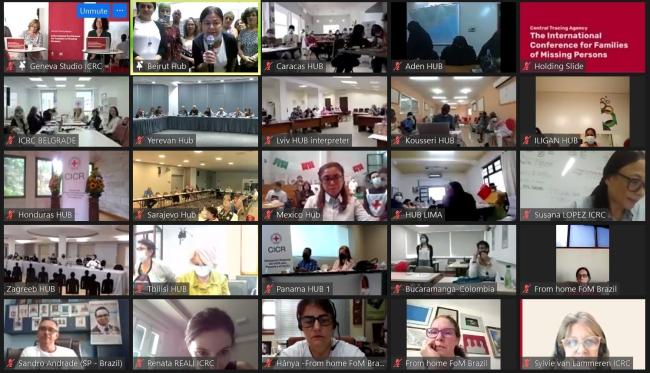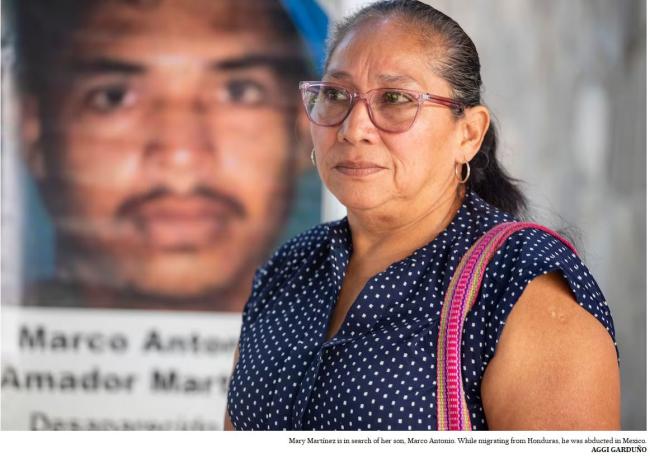A shared pain, a shared purpose, and a shared hope

II International Conference for Families of Missing Persons
In the midst of the global pandemic, when people everywhere are feeling isolated from their loved ones, more than 500 families of missing persons from around the world have come together to share their own stories of loss and hope, resistance and resilience.
Though they are united by the same desire to know the fate and whereabouts of their missing relatives, families can often feel alone in their situations, not realising how many others are also searching, also living with uncertainty.
Recognising the vital role of families, as fundamental actors in the search for their loved ones, the Central Tracing Agency (CTA) of the International Committee of the Red Cross (ICRC) hosted the Second International Conference for Families of Missing Persons, from 6-8 September.
Families, representing 35 contexts in the Asia-Pacific, Eurasia, Africa, the Middle East and the Americas regions, gathered virtually online, and in-person in hubs, in homes and in ICRC facilities watching pre-recorded testimonies from other families around the world.
Afterwards, in-person participants discussed among themselves and then joined virtual live global sessions to discuss with the other hubs and share their feedback and experiences on the topics.
To listen to their stories has made us more courageous and stronger.
Many participants reported feeling inspired to take action after listening during the live sessions and modules to the experiences of others.
Others said hearing about the challenges and successes of different families had helped them better understand the efforts and creativity available in pursuing actions to advocate for their needs further.
“We learned a lot from the experiences and testimonies of others. To listen to their stories has made us more courageous and stronger,” said a family representative from Yemen.
The conference, organized by the CTA’s Missing Persons Project, provided opportunities to share experiences and learn from each other about their rights, how to participate in the search process, be part of identification mechanisms, and advocate for a better response to their needs.
These global live sessions were offered throughout the day, to cater for all time zones and to offer families the possibility to interact, share their own examples, ask questions, and learn about other contexts, and importantly to also share messages of hope, encouragement, and inspiration.
“This conference gave us the opportunity to reconnect. We often hear the words – you are not alone – during these two days it was more than a phrase, it was a reality. You are not alone. Together we are stronger. Your fight is our fight. Our fight is your fight.”
You are not alone. Together we are stronger. Your fight is our fight. Our fight is your fight
Participants said they now feel they belong to a global community that understands their anguish and suffering.
As a participant from Belgrade explained, “during all these years, we often felt lonely and isolated. Then the pandemic arrived and isolated us even more.”
“This conference gave us the opportunity to reconnect. We often hear the words – you are not alone – during these two days it was more than a phrase, it was a reality. You are not alone. Together we are stronger. Your fight is our fight. Our fight is your fight.”
Several participants suggested the creation of a Global Community of Families of Missing Persons where the peer-to-peer experience sharing that started during this conference could continue, and where families could virtually continue sharing and giving support to each other.
Structured around four key topics, the core objective of the conference was to make families feel part of a global community and promote peer-to-peer exchanges. The topics were:
- how to get organised and the role of family’s associations
- the search, including in foreign countries, and identification process
- what are the benefits of psychosocial, economic and legal support
- how to cope with long term absence, and the impact on young generations
Though the experiences of each family were different whether through the circumstances of disappearance (armed conflict, violence, migration), or through the moment in time their relatives had gone missing (some very recently, others decades ago) many agreed they felt transformed by the experience of connecting across the world with a like-minded community.
Many of the attending families, referred to the conference as an “eye-opening experience” on the global dimension of the issue and the fact that “it does not happen only in my country”.
“Before now, I used to think that it was only us in Nigeria to live with this tragedy of having missing family members, but I now realize that we are not alone and that globally there are other people like us who are suffering from having missing family members” said a participant from Yola in Nigeria.
“Before now, I used to think that it was only us in Nigeria to live with this tragedy of having missing family members, but I now realize that we are not alone and that globally there are other people like us who are suffering from having missing family members”
The conference allowed us to change the atmosphere.
For many participating families, the conference provided a break in their daily routines allowing them to step out of isolation, whether because they lived in IDPs or refugee camps, or because the pandemic forced them at home.
“We enjoyed our time, and the conference made us feel better. The conference allowed us to change the atmosphere.” Syrian family from Jordan.
It also provided inspiring ideas to families in various contexts. “We are going to constitute an association ourselves because as we saw from other contexts, together we are stronger and we can support each other” said families in Abidjan, Cote d’Ivoire.
“Because of the situation and the difficulties here, some of us were feeling helpless. After watching the interview of a mother from Honduras, it has given us the energy to renew our search, and we can talk with authorities to raise the issue, we can find help out there”.
The conference
Running almost non-stop over three days, the logistical challenges included coordinating six simultaneous translations for the online sessions, as well as local translators in the hubs, and providing IT and audio-visual support for those participating in person and online.
Florence Anselmo, Head of the Central Tracing Agency offered her thanks for the “enormous and unprecedented work”.
“We want to thank everyone: the families, who stayed awake late at night or woke up early in the morning to join a live discussion; all the delegations and National Societies involved. All those in the ICRC who supported and together with us, believed in this project, even if it seemed initially an impossible challenge”. Caroline Douilliez, Head of the Missing Persons Project (MPP) and Martina Zaccaro, Community Manager (MPP), who moderated the sessions, said the outcomes made all the effort worthwhile.
“The fact that most families reported leaving the conference feeling inspired by the solidarity, empathy and support of others and comforted in knowing that they were not alone in their pain, repaid all our efforts and convinced us even more of the important convening and connecting role of the Central Tracing Agency.”
Families also expressed their gratitude for the work of the ICRC with a participant from Venezuela saying, “we want to thank ICRC having taken this time. You feel our pain as if it was your own and this is something that not only comforts us but strengthen us in the search.”



